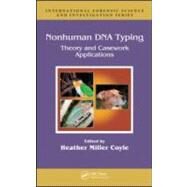- ISBN: 9780824725938 | 082472593X
- Cover: Hardcover
- Copyright: 8/29/2007
The association of a suspect with the victim or crime scene through DNA evidence is one of the most powerful statements of complicity in a crime imaginable. No category of evidence has ever had the complete capacity to convict or exonerate an accused so absolutely in the eyes of the public. With the discriminatory powers of DNA and the variety of DNA markers now in regular use, the one thing keeping a third of all cases unsolved is the lack of human DNA evidence. However, the identification of polymorphic genetic loci in cats, dogs, plants, insects, bacteria, and viruses can provide the critical link between suspect and scene in the absence of human DNA. Non-Human DNA Typing: Theory and Casework Applications provides an introduction to the basic science underlying the emerging field of non-human DNA typing. It examines the use of non-human DNA evidence not just in homicide cases, but also in drug trafficking, poaching of endangered species, livestock fraud, and missing persons, as well as the identification of primary and secondary crime scenes. The book demonstrates the recognition, collection, and preservation of biological evidence at a crime scene, techniques of DNA fingerprinting, and DNA profiling. Using a wide variety of examples, applications, and case studies, the author describes the STR analysis of canine and feline samples, insects, and fungi, and their role as evidence in forensic science. Chapters consider the development of testing methods for animal evidence, soil DNA typing, and the use of DNA typing in wildlife investigations. A useful appendix includes an overview of the history of forensic serology and DNA. Combining science, case examples, legal decisions, and references, Non-Human DNA Typing: Theory and Casework Applications presents the forensic and legal applications of non-human DNA evidence for scientists, law enforcement, and attorneys.







